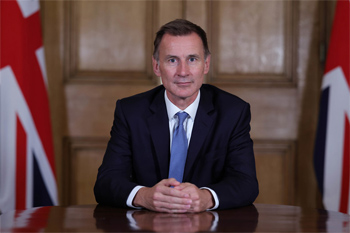In the Spring Budget, chancellor Jeremy Hunt announced £8.8bn for a second round of the City Region Sustainable Transport Settlements (CRSTS) in a move that buoyed the local sector after recent funding cuts.
He also revealed that fuel duty will be maintained at the current levels for an additional 12 months and confirmed a further £200m in 2023-24 to tackle what Mr Hunt described as ‘the curse of potholes’, under the Government’s latest Pothole Fund spend.
The 'pothole' cash can be used to address wider concerns than just low reactive maintenance and allows local authorities in England to ‘complete resurfacing, and invest in major repairs and renewals, such as keeping bridges and major structures open’.
Mr Hunt said he was continuing the Fuel Duty freeze because ‘inflation remains high’, with the Treasury adding that 'petrol and diesel prices continue to be volatile'.
Taken with earlier cuts to active travel spending the move has been seen in some quarters as a return to prioritising motorists after the interest of Boris Johnson’s government in supporting active travel and buses.
 ‘The Government is continuing to support households and businesses by maintaining the rates of fuel duty at the current levels for an additional 12 months through extending the temporary 5p Fuel Duty cut and cancelling the planned increase in line with inflation for 2023-24,’ the Budget document stated.
‘The Government is continuing to support households and businesses by maintaining the rates of fuel duty at the current levels for an additional 12 months through extending the temporary 5p Fuel Duty cut and cancelling the planned increase in line with inflation for 2023-24,’ the Budget document stated.
On the main CRSTS announcement, the Budget document highlighted: ‘At Autumn Budget 2021, the government announced an unprecedented investment package of £5.7bn for eight English city regions to transform their local transport networks between 2022-23 and 2026-27.
'The City Region Sustainable Transport Settlements increase the devolved powers of MCAs [mayoral combined authorities] and aim to improve sustainability. Spring Budget announces that the government is committing £8.8bn for a second round of the programme covering 2027-28 to 2031-32, with funding for Greater Manchester and the West Midlands to be included in their Single Settlements.’
The Treasury said the cash will help 'transform local transport networks' including by potentially developing mass transit networks and sustainable transport options across England's city regions.
Elsewhere, the Budget included over £200m for 16 'high-quality' regeneration projects and £400m is being set aside for the roll-out of new Levelling Up Partnerships, 'to provide bespoke place-based regeneration in 20 of England’s areas most in need of levelling up over 2023 and 2024-25'.
A third round of the Levelling Up Fund will also go ahead as planned later this year with a further £1bn for places across the UK.
In a major local transport and infrastructure delivery reform, the Government announced plans to end Local Enterprise Partnerships and transfer the responsibilities back to councils.
The Treasury said: 'The government is committed to empowering democratically elected local leaders at every opportunity. To this end, the government intends for the functions of Local Enterprise Partnerships (LEPs) to be delivered by local government in the future.
'Therefore, the government is minded to withdraw central government support for LEPs from April 2024. DLUHC and the Department for Business and Trade will now consult on these proposals, before confirming a decision. The government will publish an updated policy position to confirm next steps by the summer.'
LEPs had formally handled billions of pounds under the Local Growth Fund, but had run into trouble due to conflict of interest scandals and a lack of transparency.
In the run-up to the Budget, transport secretary Mark Harper unveiled huge delays to transport schemes, including HS2 and the Lower Thames Crossing, and cuts to cycling and walking spending.
As well as a shunting forward the spending profile for the strategic road network’s by around two years, Mr Harper announced that active travel spending will be £3bn over this Parliament.
In July of last year, the Government announced it was due to spend around £3.8bn from just April 2021 to March 2025 on active travel, under its second cycling and walking investment strategy.
RAC head of roads policy Nicholas Lyes said: ‘We welcome the Government’s decision to keep the 5p fuel duty cut in place for another 12 months. The cut has given drivers some much-needed relief in what has been the most torrid year ever at the pumps, with price records being broken even after duty was cut. Given the importance of driving for consumers and businesses, duty should be kept low to help fight inflation.
‘While welcome, another £200m is unlikely to make a big difference to the overall quality of our dilapidated local roads. We need to significantly increase funding for local road maintenance and improvement so councils can resurface roads properly rather than patching them up and hoping for the best. Last year the Government spent £1.125bn on local roads in England which is in stark contrast to the £7bn that went into major roads from car tax, despite local roads covering so many more miles.’
Silviya Barrett from Campaign for Better Transport, said: ‘We are disappointed that the chancellor has chosen to maintain the 5p fuel duty cut for another 12 months and continue the fuel duty freeze for a 13th year, especially as this will disproportionally benefit those who are already better off.
'If the Government really wanted to help those who are struggling the most with the cost-of-living crisis, and support green growth, it should be helping to reduce the cost of public transport.’





